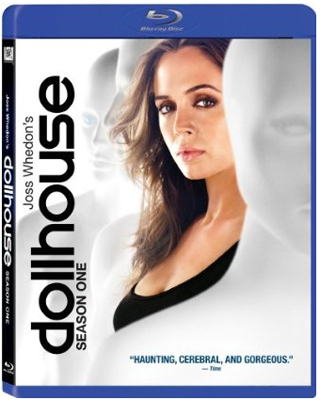Dollhouse
The benefit of watching a series in
one fell swoop is that you know its reputation. When Dollhouse
first aired, the first episode left a lot of people cold,
and it struggled to find a foothold with viewers. Sure, both
series creator Joss Whedon and producer/star Eliza Dushku
swore that with episode six everything would change, but that
wasn't exactly a ringing endorsement.
However, when you know that something's building, and
there's an intention behind every piece of information confirmed
by other people telling you it's a great series, suddenly
those first five episodes do get better. And in truth,
if the show had been created by anyone other than Whedon,
it's hard to imagine that people would have been so bent
out of shape by how ordinary they are.
With very little (but crucial) subplotting that at least
place them in a set order, the opening five seem like random
adventures of the week for any undercover cop show. Echo
(Dushku) plays hostage negotiator. Then she becomes the
most dangerous game. One week she pretends to be a back-up
singer in order to protect a pop star.
They're even shot sort of mundanely, as in that popstar
episode where one back-up singer doesn't belong, dressed
all frumpily while everyone else is near naked, just to
cover that she's a stuntwoman about to be lit on fire. These
are episodes weighed down by a nervous television network,
wanting to get something unique and original but insisting
that it not look like it.
Yet there's dynamic casting and a cool concept that keeps
lurking in the background though serving more as a macguffin
until… the sixth episode. Then things start to coalesce,
the continuity tightens and guest-star Patton Oswalt will
break your heart. Just as some serious actors like Alec
Baldwin waited a while to prove themselves secretly hilarious,
the brilliant comedian Oswalt turns out to be secretly a
real actor, and a really good one.
For the most part, too, Dollhouse
is so coolly plotted that it overcomes that at the center,
Dushku is an actress who rarely veers from her base persona.
It's only a little frustrating that so many of the blank
dolls around her are able to have accents come and go, and
fully different personalities including those of other actors
on the show. When the "Big Bad" shows up - I'm not going
to spoil it in case it's not well known - we catch
a glimpse of a show even cooler if Dushku would or could
stretch a little more.
But it's compelling as it is, though the
review copy of the DVD sent to the Fanboy Planet Magic Mailbox
was curiously incomplete, lacking the fabled thirteenth
episode "Epitaph One" set a decade in the future and not
aired on U.S. television. Allegedly (and I'll be sneaking
Ric Bretschneider's Comic-Con exclusive edition to prove
it) the thirteenth episode lays out a lot of direction for
the series and proves that it has a lot of places yet to
go after resolving its initial plotline.
Among the extras are the original pilot, called "Echo,"
which Whedon famously scrapped believing he could do better.
Pieces of that show up throughout the season, so watching
it is more an exercise in the writers' process, and how
revising can save a work.
Whedon also provides commentary on a few
episodes, joined once by Dushku. Together, they're understandably
a mutual admiration society, and while it doesn't dim the
candidness, it does up the fawning level.
Yet why shouldn't they fawn? Once again,
Whedon has taken a somewhat simple concept (see "girl kills
vampires," "western in space") and made it into an examination
of what it means to be human. All the while it's disguised
as girl kicking butt time after time, but what's wrong with
that?
|






